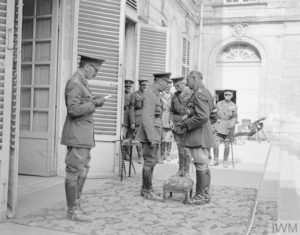Monday August 12th, 1918
Sick with Rheumatism. No duty. Felt better as day goes by. Walk at night to farm.
Frank is increasingly struggling with the rheumatism that will blight his health for the rest of his life. The good news today is that he feels better by evening and walks out to visit a nearby farm.
Australian Corps at the Battle of Amiens
Yesterday, the Sunday newspapers were full of the victory at Amiens. The official correspondent with the Australian Imperial Force (AIF) in France, Charles Bean, had the following to say:
‘Before midday the Australians, who were about nine miles from their starting-place, made a gap sufficient for the cavalry to pass.
On a broad gauge railway here there was a standing German engine with several trucks, and steam up, just moving off. At the far end of this train was a great German 9-inch railway gun, which they captured, with the train of ammunition complete.
A couple of miles farther on a train full of reinforcements in order hurriedly to hold the line and another ,which as just leaving, were also caught.
Our losses throughout all this were ridiculously small. One battalion which we found at the furthest part of the advance had only three casualties. I do not know the exact figures for the rest, but they are little more than those of an ordinary day in many parts of the line.’¹
Charles Bean

The photograph shows General Monash being knighted by King George V at the HQ of the Australian Corps today, exactly a hundred years ago. This was the first battlefield honours awarded by a British monarch in over two hundred years.*
Ironically, Charles Bean had campaigned, thankfully unsuccessfully, agains the appointment of General Monash as commander of the Australian Corps. Part of this seems to have been motivated by anti-semitism. Ultimately Bean recognized the General’s strengths, though he rather churlishly declared that Monash ‘made a better Corps commander than a Brigadier‘.²
After the war Bean became the editor and a driving force behind the 12-volume ‘Official History of Australia in the War of 1914–1918′ and the establishment of the Australian War Memorial. His writings also helped to ‘characterize’ the Australian and New Zealand soldier in war.²
13th (Service) Battalion War Diary – 12th August 1918 – Haudricourt
Training and work as per programme. 5 OR having rejoined are again taken on from 10-8-18. 1 OR struck off effective strength on evacuation to No 3 Stationary Hospital Rouen. 2Lt H Smith returned from leave to UK. 2Lt CF Groves and F Turner proceeded on leave to UK.
References & Further Reading
¹ ‘Captures made by the Australians’, The Observer, August 11th, 1918, page 5
² Charles Bean, Wikipedia
* Q 9242, copyright Imperial War Museums


